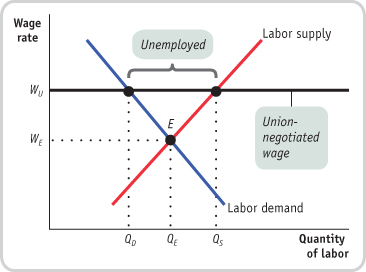Question 14.5
2. Why does collective bargaining have the same general effect on unemployment as a minimum wage? Illustrate your answer with a diagram.
A binding minimum wage represents a price floor below which wages cannot fall. As a result, actual wages cannot move toward equilibrium. So a minimum wage causes the quantity of labor supplied to exceed the quantity of labor demanded. Because this surplus of labor reflects unemployed workers, it affects the unemployment rate. Collective bargaining has a similar effect—unions are able to raise the wage above the equilibrium level to a level like WU in the accompanying diagram. This will act like a minimum wage by causing the number of job-seekers to be larger than the number of workers firms are willing to hire. Collective bargaining causes the unemployment rate to be higher than it otherwise would be, as shown in the accompanying diagram.
